
Neococytius is a monotypic moth genus in the family Sphingidae erected by Ronald W. Hodges in 1971. Its only species, Neococytius cluentius, the Cluentius sphinx, was first described by Pieter Cramer in 1775 as Sphinx cluentius. It is found in northern South America, Central America, Mexico and the Caribbean. It is rare on Cuba. It has been recorded in North America, from Mississippi north to Michigan and Illinois.
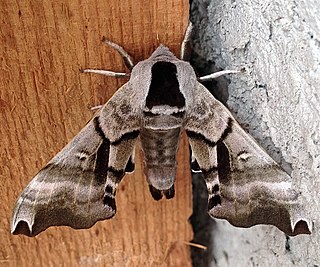
Smerinthus cerisyi, the one-eyed sphinx or Cerisy's sphinx, is a moth of the family Sphingidae. The species was first described by William Kirby who named the species in honor of Alexandre Louis Lefèbvre de Cérisy in 1837.
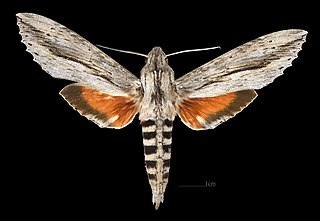
Erinnyis ello, the ello sphinx, is a moth of the family Sphingidae. The species was first described by Carl Linnaeus in his 1758 10th edition of Systema Naturae. It is distributed from Argentina through Central America to the United States as far north as Nevada.

Xylophanes tersa, the tersa sphinx, is a moth of the family Sphingidae. The species was first described by Carl Linnaeus in 1771. It is found from the United States, through Mexico, the West Indies and Central America and into parts of South America. An occasional stray can be found as far north as Canada.
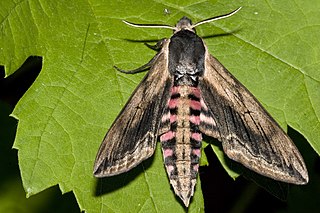
Sphinx ligustri, the privet hawk moth, is a moth found in most of the Palearctic realm. The species was first described by Carl Linnaeus in his 1758 10th edition of Systema Naturae.

Erinnyis lassauxii, or Lassaux's sphinx, is a moth of the family Sphingidae.

Pachysphinx modesta, the modest sphinx or poplar sphinx, is a moth of the family Sphingidae. The species was first described by Thaddeus William Harris in 1839.
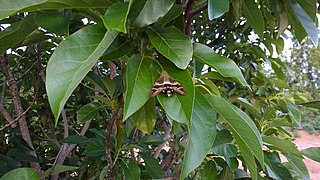
Aellopos fadus, the Fadus sphinx, is a moth of the family Sphingidae. The species was first described by Pieter Cramer in 1776.
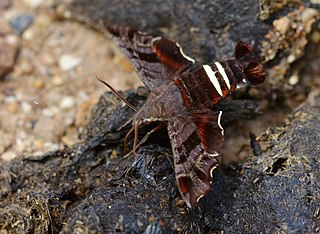
Amphion floridensis, the Nessus sphinx, is a day-flying moth of the family Sphingidae. The species was described by Pieter Cramer in 1777, and renamed in 1920. It is the only member of the genus Amphion erected by Jacob Hübner in 1819. It lives throughout the eastern United States and Canada and occasionally south into Mexico, and is one of the more commonly encountered day-flying moths in the region, easily recognized by the two bright-yellow bands across the abdomen.

The fabulous green sphinx moth or fabulous green sphinx of Kauai is a species of moth in the family Sphingidae. It is monotypic within the genus Tinostoma. It is endemic to the Hawaiian Islands and was thought to be extinct until it was rediscovered in 1998. The genus was erected by Walter Rothschild and Karl Jordan in 1903 and the species was first described by Edward Meyrick in 1899.

Deidamia inscriptum, the lettered sphinx, is a species of moth of the family Sphingidae. It is the only member of the genus Deidamia. The species was first described by Thaddeus William Harris in 1839 and the genus was erected by James Brackenridge Clemens in 1859.

Sphinx morio, the larch hawk moth or Asian pine hawkmoth, is a moth of the family Sphingidae. It is found in Russia, the Korean Peninsula, Japan and China.

Sphinx poecila, the poecila sphinx, is a moth of the family Sphingidae. It is found from Newfoundland and Maine south to Pennsylvania and west to Michigan, northeastern Illinois and Wisconsin.

Sphinx is a genus of moths in the family Sphingidae. The genus was erected by Carl Linnaeus in his 1758 10th edition of Systema Naturae.

Hyles perkinsi, or Perkin's sphinx, is a species of moth of the family Sphingidae. It was described by Otto Herman Swezey in 1920. It is endemic to the Hawaiian islands of Oahu and Molokai.
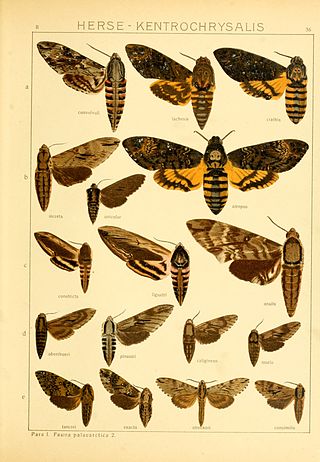
Sphinx oberthueri is a moth of the family Sphingidae. It is found from central and south-western China to northern Thailand.

Sphinx formosana is a moth of the family Sphingidae. It is known from the northern central mountains of Taiwan.

Sphinx constricta, the Japanese privet hawkmoth, is a moth of the family Sphingidae. It is known from Japan.

Sphinx crassistriga is a moth of the family Sphingidae. It is known from Japan.
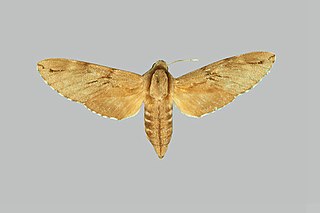
Sphinx caligineus, the Chinese pine hawkmoth, is a moth of the family Sphingidae. It is known from Japan, north-eastern, eastern, central and southern China, South Korea, northern Thailand and southern Vietnam.




















